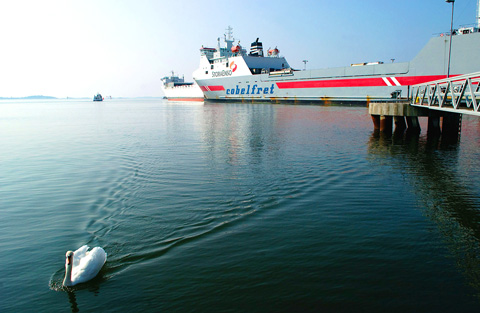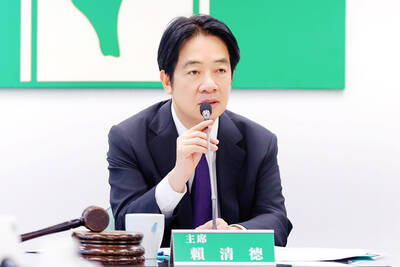Something unusual is happening in Swedish waters. Crews docking at the Port of Gothenburg are turning off their engines and plugging into the local power grid rather than burning diesel oil or sulfurous bunker fuel — a thick, black residue left over from refining oil.
“I always knew these extremely dirty bunker fuels were helping produce acid rain that falls so heavily over this part of Sweden,” said Per Lindeberg, the port’s electrical manager and an avid fisherman. “I was very happy when we could switch off the ships.”
Similar high-voltage technologies have been introduced at Zeebrugge in Belgium, and in Los Angeles and Long Beach in California. But as at Gothenburg, only a small fraction of ships are equipped with plugs, so the benefits from shore-side electricity so far have been limited.

PHOTO: NY TIMES NEWS SERVICE
And despite the growing availability of cleaner technologies, the shipping industry has made little progress toward becoming greener, even as traffic grows heavier on existing routes and new routes open up in the Arctic. Indeed, the most recent efforts to tackle the problem have met resistance — less from the shipping industry, however, than from the big oil companies that supply the dirty fuel.
Shipping is responsible for about twice the emissions of carbon dioxide as aviation — yet airlines have come under greater criticism. Particles emitted by ships burning heavy bunker fuel, described by some seafarers as “black yogurt” for its consistency, also contain soot that researchers say captures heat when it settles on ice and could be accelerating the melting of the polar ice caps.
Health experts say the particulates exacerbate respiratory illnesses, cardiopulmonary disorders and lung cancers, particularly among people who live near heavy ship traffic.
Ship engines also produce large quantities of nitrogen, which contribute to the formation of algal blooms at sea. Those use up oxygen when they decompose and create so-called marine dead zones in heavily trafficked waters, like the Baltic Sea.
“The sheer volume of pollutants from shipping has grown exponentially along with the growth of our economies and of global trade,” said Achim Steiner, the executive director of the UN Environment Program. “Shipping is just less visible than other industries, so for too long it has slipped to the bottom of the agenda.”
James Corbett, an associate professor of marine policy at the University of Delaware, is the co-author of a study published in December that attributed 60,000 cardiopulmonary and lung cancer deaths each year globally to shipping emissions and forecast an increase to nearly 85,000 deaths by 2012 under current trends.
With the harm growing increasingly evident, this month the International Maritime Organization, a UN body, proposed reducing the sulfur content of marine fuels starting in 2010 on all ships. It also proposed steps reducing nitrogen oxide emissions from engines on new ships from 2011, all of which the organization intends to adopt in October.
The organization is continuing to work on separate measures to deal with the more difficult issue of carbon dioxide emissions.
The European Commission, the executive arm of the 27-nation EU, has said that if the International Maritime Organization fails to make concrete proposals on carbon dioxide by the end of the year, it would consider regulating the matter itself, perhaps by including shipping in the European carbon trading system. That could oblige ship owners to buy pollution permits from other sectors.
The European Parliament this week passed a nonbinding resolution urging the commission to act “urgently.”
The shipping industry has supported the organization’s recommendations because they would apply globally and be introduced gradually. But the fuel industry immediately called for a review of the most important element: a global cap on sulfur content of marine fuels of 0.5 percent by 2020 from the current maximum level of 4.5 percent.
A study last year for the American Petroleum Institute found it would cost the fuel industry US$126 billion over 13 years to invest in equipment and chemicals to replace polluting bunker fuels with sufficient amounts of cleaner diesel to supply the shipping industry.
Already, Wallenius Willemsen Logistics, based in Norway and Sweden, uses fuels that contain less than half the amount of sulfur that would be required under the proposed International Maritime rules.
“We know customers want greener shipping companies as part of their overall supply chain,” said Lena Blomqvist, an environmental and operations expert for Wallenius, explaining why the company was prepared to pay more for cleaner fuel.
In Gothenburg, ship crews hook up vessels using the shore-side electricity system with a single, giant plug within about 10 minutes of docking. The technology cuts emissions of sulfur, nitrogen and particulate emissions by berthed ships to nearly zero, and cuts engine noise too.
The system was pioneered in Gothenburg eight years ago after Stora Enso, a Swedish company in the energy-intensive paper industry, asked the port for help to improve its environmental profile. Costs for the system run from 70,000 euros (US$109,000) to 640,000 euros for each outlet and largely depend on how easy it is to connect to a nearby power grid.
In Gothenburg, the costs of the system were shared by Stora Enso, the port and the Swedish government. The electricity comes from the local grid, but Stora Enso pays slightly more for “green” electricity generated by windmills.

President William Lai (賴清德) yesterday criticized the nuclear energy referendum scheduled for Saturday next week, saying that holding the plebiscite before the government can conduct safety evaluations is a denial of the public’s right to make informed decisions. Lai, who is also the chairman of the Democratic Progressive Party (DPP), made the comments at the party’s Central Standing Committee meeting at its headquarters in Taipei. ‘NO’ “I will go to the ballot box on Saturday next week to cast a ‘no’ vote, as we all should do,” he said as he called on the public to reject the proposition to reactivate the decommissioned

In his National Day Rally speech on Sunday, Singaporean Prime Minister Lawrence Wong (黃循財) quoted the Taiwanese song One Small Umbrella (一支小雨傘) to describe his nation’s situation. Wong’s use of such a song shows Singapore’s familiarity with Taiwan’s culture and is a perfect reflection of exchanges between the two nations, Representative to Singapore Tung Chen-yuan (童振源) said yesterday in a post on Facebook. Wong quoted the song, saying: “As the rain gets heavier, I will take care of you, and you,” in Mandarin, using it as a metaphor for Singaporeans coming together to face challenges. Other Singaporean politicians have also used Taiwanese songs

US President Donald Trump on Friday said that Chinese President Xi Jinping (習近平) told him China would not invade Taiwan while Trump is in office. Trump made the remarks in an interview with Fox News, ahead of talks with Russian President Vladimir Putin over Moscow’s invasion of Ukraine. “I will tell you, you know, you have a very similar thing with President Xi of China and Taiwan, but I don’t believe there’s any way it’s going to happen as long as I’m here. We’ll see,” Trump said during an interview on Fox News’ Special Report. “He told me: ‘I will never do

CLAMPING DOWN: At the preliminary stage on Jan. 1 next year, only core personnel of the military, the civil service and public schools would be subject to inspections Regular checks are to be conducted from next year to clamp down on military personnel, civil servants and public-school teachers with Chinese citizenship or Chinese household registration, the Mainland Affairs Council (MAC) said yesterday. Article 9-1 of the Act Governing Relations Between the People of the Taiwan Area and the Mainland Area (臺灣地區與大陸地區人民關係條例) stipulates that Taiwanese who obtain Chinese household registration or a Chinese passport would be deprived of their Taiwanese citizenship and lose their right to work in the military, public service or public schools, it said. To identify and prevent the illegal employment of holders of Chinese ID cards or